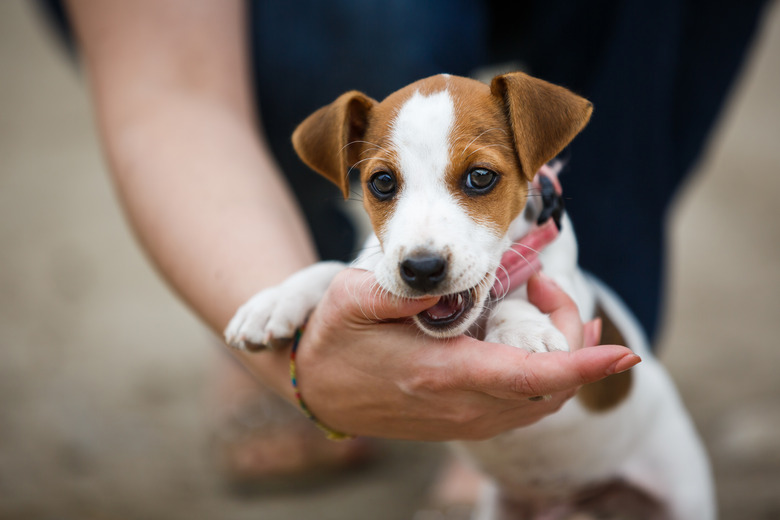What Does It Mean If A Dog Chews On Your Hand?
If you have a puppy or even a particularly active dog, you've likely found yourself in this scenario before: You're sitting down and minding your own business when your restless canine companion bounds over and covers your hand in his wet, tooth-filled mouth. Hand chewing is a common occurrence among dogs, especially puppies. If you've ever wondered why your dog bites people's hands, the answer is ultimately an innocent one, although dismissing the behavior can result in destruction down the line.
Why do dogs chew?
Why do dogs chew?
According to the American Society for the Prevention of Cruelty to Animals, chewing is a natural behavior for dogs and one that serves multiple purposes. For starters, chewing helps dogs clean their teeth and keep their jaws healthy, which is why some dogs can spend hours chewing on items like sticks, bones, or toys. Additionally, chewing just feels good to dogs and is often done to help them relax, ease anxiety, or even just to distract themselves when they get bored. Sometimes, however, dogs reach for inappropriate things to chew, like furniture, shoes, or even our hands.
What does biting a hand mean?
What does biting a hand mean?
To put it simply, hand biting means that your dog is excited. While we have the use of language to express our glee, dogs use their mouth in a different way: by latching on with their teeth. If you have a puppy in your home, you may notice especially excessive chewing habits, but why do they do it?
As the American Kennel Club explains, puppies begin playing and learning from a very early age thanks to their littermates. While we humans may use our hands to touch or roughhouse with our fellow siblings, dogs mostly use play biting to chew on or tug at their puppy playmates. If you see a dog play biting with another dog, it means they are both learning valuable lessons in setting and respecting boundaries. When we reach out to pet their heads or bodies, an excited puppy may begin to engage in play behavior because that's what they think is happening. This can often result in a barrage of needlelike teeth nipping at your skin, a sensation that can range from annoying to painful.
When do puppies stop biting?
When do puppies stop biting?
While the close quarters shared with their littermates introduces puppies to playing, it also teaches them boundaries through bite inhibition or understanding when enough is enough. If your puppy is no longer with her littermates, you can teach her how to stop biting by making a loud noise or yelping sound each time her mouth makes contact with your skin. Dogster assures that puppies with a good understanding of boundaries should stop chewing at around six months or once they have finished teething. In the meantime, give your puppy plenty of approved items on which to chew to soothe her aching gums, like Kongs or other chew toys.
How to stop hand chewing
How to stop hand chewing
When it comes to dogs, the best solution to just about any problem is usually prevention. Because most dogs resort to hand chewing out of boredom, taking the proper measures to assure that his physical and mental needs are met will go a long way in reducing unwanted chewing. For some dogs, physical exercise is required to wear them out, while others may just need some affection or one-on-one time with their most treasured thing in the world—you! If your dog tends to chew out of boredom, try meeting these needs and that may prevent hand chewing. The American Kennel Club also adds that you can teach your dog to associate not chewing with positivity by rewarding him each time he lets you pet him without wrapping his mouth around your hands.
If you notice that your dog is chewing or nipping at your hand every time you reach for a particular spot, stop reaching for that area and mention this behavior to your veterinarian to rule out the possibility of any injuries. A dog in pain will almost always protect himself, so take note of any particular patterns you may notice.
